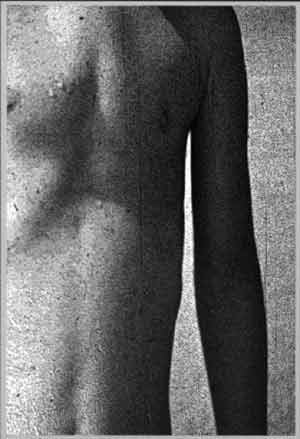|
HOME | SEARCH | ARCHIVE |
|
Scholars, public take up emotional issues at 'Who Owns the Body?'
By Cathy Cockrell, Public Affairs
| |
 |
27 SEPTEMBER 00 | Not a chair squeaked or a paper rustled in International House auditorium as images took form on the projector screen: forensic workers equipped with hard hats, oxygen tanks, lights and extension ladders exhuming mass graves deep in Bosnian soil.
"Who Owns the Body," an international conference on campus last week, was punctuated with many such moments, as scholars, activists and more than 300 participants considered a broad range of issues - sometimes grim, always contemporary and urgent - related to the human body and human rights.
"The conference had an intensity that did not let up," said conference program administrator Laurie Goldman, director of resource development in the Office of the Vice Chancellor for Research. "People made a connection among the three days; it was remarkable."
Day one addressed "The Body and the State," particularly the aftermath of state-sponsored torture and terror and of atrocities ranging from the Stockton schoolyard massacre to the war in Bosnia and Herzegovina in the '90s.
Panelists used the small Bosnian town of Srebrenica - where 7,000 men and boys disappeared after the United Nations demilitarized "safe zone" fell to the Bosnian Serb Army in 1995 - to talk about conflicts between families affected by such atrocities across the globe and agencies charged with finding, exhuming and identifying bodies of the victims.
"We've got a problem here: how to satisfy the legal needs and also the humanitarian needs of the family," said Eric Stover, director of Berkeley's Human Rights Center, following the presentations.
"There are (also) those families that want to keep looking (for their loved ones) their whole lives, and those who want to close the graves and create a memorial," Stover noted. "Forensic teams get caught in the middle."
Part of the inspiration for "Who Owns the Body," according to Goldman, was the campus's involvement in implementing the federal Native American Graves Protection and Repatriation Act of 1990. But rather than focus solely on repatriation of Native American remains, she said, the Office of the Vice Chancellor for Research saw an opportunity "to broaden the subject to a global reach, and to other human rights issues involving the body."
The urgency of the subject matter was evident from the lines that formed at the microphone following each conference session, as members of the audience queued up to pose deeply felt questions in accents from around the globe.
On Friday, native and non-native speakers spoke on native repatriation issues and on two renowned cases in particular - that of Ishi, the last survivor of California's Yahi tribe who was friend and subject of the late campus anthropologist Alfred Kroeber, and Kennewick Man, a 9,500-year old skeleton found in eastern Washington. The skeleton has become the focus of controversy between scientists interested in studying the remains and American Indian nations who believe they should be buried respectfully. At one point participants listened with hushed attention to the voice of Ishi as recorded by Alfred Kroeber.
The final day was devoted to the global traffic in human organs, tissues and body parts. In one heartbreaking account, a South African mother, Rosemary Thandiwe Sitsheshe, told how her teenage son was killed in Capetown in 1992; his body parts were taken by the morgue, as had those of many other black bodies held there.
"Many participants said they were unaware of these kinds of situations in other parts of the world," Goldman said of such accounts. Sitsheshe, for example, said she hadn't known about Native American repatriation issues and expressed "a great solidarity" with native peoples in the Americas.
Several Serbs who had been critical of the lack of Serb participation in the initial session "were impressed by the panel's judiciousness," Goldman said, and expressed interest in working with the Human Rights Center.
An archival video tape of the entire conference, including the keynote speech on the trafficking of human beings for prostitution, will be available soon. Its location in the Library will be posted soon on the Web site of the Office of the Vice Chancellor for Research. Go to www.chance.berkeley.edu/research and select the conference icon.
Home | Search | Archive | About | Contact | More News
Copyright 2000, The Regents of the University of California.
Produced and maintained by the Office of Public Affairs at UC Berkeley.
Comments? E-mail berkeleyan@pa.urel.berkeley.edu.